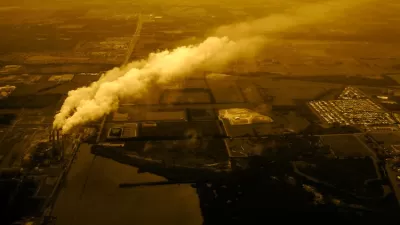Kaid Benfield highlights nine low-tech steps that he recommends can help communities prepare for the coming changes in global climate.
With average global temperature climbing at record rates and scientists speculating that average US temperatures could be 3 to 9 degrees higher by the end of the century, climate resilience has become a concern for researchers, planners, academics, and authorities.
Although large-scale coordinated efforts to diminish the warming trajectory will take time, investment, and leadership, there are several low-tech initiatives that individuals and groups can implement in their own communities to prepare for rising temperatures, notes Benfield.
His list includes:
- Bringing more vegetation into neighborhoods
- Planting city-scaled community gardens
- Using drought-resistant landscaping
- Using light-colored roofing and pavement
- Getting serious about sea level rise and storm surges
- Saving older buildings
- When building new, following "original green" practices
- Keeping the regional footprint small and well-connected
- Updating zoning and building codes to facilitate resilience
FULL STORY: Nine low-tech steps for community resilience in a warming climate

Planetizen Federal Action Tracker
A weekly monitor of how Trump’s orders and actions are impacting planners and planning in America.

Maui's Vacation Rental Debate Turns Ugly
Verbal attacks, misinformation campaigns and fistfights plague a high-stakes debate to convert thousands of vacation rentals into long-term housing.

Restaurant Patios Were a Pandemic Win — Why Were They so Hard to Keep?
Social distancing requirements and changes in travel patterns prompted cities to pilot new uses for street and sidewalk space. Then it got complicated.

In California Battle of Housing vs. Environment, Housing Just Won
A new state law significantly limits the power of CEQA, an environmental review law that served as a powerful tool for blocking new development.

Boulder Eliminates Parking Minimums Citywide
Officials estimate the cost of building a single underground parking space at up to $100,000.

Orange County, Florida Adopts Largest US “Sprawl Repair” Code
The ‘Orange Code’ seeks to rectify decades of sprawl-inducing, car-oriented development.
Urban Design for Planners 1: Software Tools
This six-course series explores essential urban design concepts using open source software and equips planners with the tools they need to participate fully in the urban design process.
Planning for Universal Design
Learn the tools for implementing Universal Design in planning regulations.
Heyer Gruel & Associates PA
JM Goldson LLC
Custer County Colorado
City of Camden Redevelopment Agency
City of Astoria
Transportation Research & Education Center (TREC) at Portland State University
Jefferson Parish Government
Camden Redevelopment Agency
City of Claremont




























